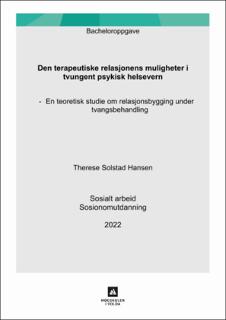| dc.description.abstract | Sosialt arbeid opererer innenfor spenningsfeltet mellom hjelp og kontroll. Innen tvungent psykisk helsevern kommer dette spenningsfeltet tydelig frem da hjelpen ofte innebærer utøvelse av tvang. Spiseforstyrrelser har den siste tiden blitt en «hot case» og ungdomspsykiatriske avdelinger landet over melder om sprengt kapasitet med pasienter helt ned i syvårsalderen. Psykisk helsevern handler vel så mye om relasjonsarbeid som selve behandlingen, også når tvang er involvert. Når pasientene blir både yngre og sykere, avdelingene strekkes til maks kapasitet og ventelistene ved behandlingsinstitusjonene er lengre enn noensinne viser det hvor stort behov det er for kunnskap som kan gjøre behandlingen lettere for både pasienten og terapeuten. Ved å rette fokus mot den terapeutiske relasjonen og selvbestemmelsesteorien søker denne studien å undersøke hvordan relasjonsarbeid kan fremmes innen tvungent psykisk helsevern, og retter fokus på pasienter med spiseforstyrrelser innlagt på ungdomspsykiatrisk avdeling. Oppgaven er en teoretisk oppgave som baserer seg på eksisterende litteratur og forskning. I diskusjonen kobles de ulike teoretiske perspektivene sammen med eksisterende forskning på feltet for å finne svar på problemstillingen. Tvang byr på utfordringer for relasjonsbyggingen og kontakten mellom terapeut og pasient. Nok en utfordring relasjonsarbeidet møter på er tid. Når tidsmangel er et faktum er det viktig at terapeuten gjennom sitt arbeid og sin væremåte viser omsorg og interesse for pasienten. Selvbestemmelsesteorien vektlegger også relasjonsarbeid, men terapeuten må også arbeide for å skape situasjoner for mestring for pasienten, samt legge til rette for at pasienten kan ta egne valg. Gjennom denne måten å arbeide på vil terapeuten kunne skape det vi kan kalle «en motivert relasjon». | en_US |
| dc.description.abstract | Abstract
Social work operates within the field of tension between help and control. In compulsory mental health care, this field of tension is clear as the help often involves the use of coercion. Eating disorders have recently become a “hot case”, and adolescents psychiatric wards across the country reports bursting capacity with patients as young as seven years old. Mental health care is as much about relationship work as the treatment itself, even when coercion is involved. When patients become both younger and sicker, the wards are stretched to the maximum capacity and the waiting lists at the treatment institutions are longer than ever, it shows how great a need there is for knowledge that can make the treatment easier for both the patient and the therapist. By focusing on the therapeutic relationship and self-determination theory, this study seeks to inspect how relationship work can be prompted in compulsory mental health care and focuses on patients with eating disorders admitted to the adolescent’s psychiatric ward. The thesis is a theoretical thesis based on existing literature and research. In the discussion, the various theoretical perspectives are linked with existing research on the field to find answers to the problem. Coercion offers challenges for the relationship building and the contact between the therapist and the patient. Another challenge the relationship work faces is time. When lack of time is a fact, it is important that the therapist through his work and way of being shows care and interest in the patient. The self-determination theory also emphasizes relational work, but the therapist must also work to create situations for mastery for the patient, as well as facilitate that the patient can make their own choices. Through this way of working, the therapist will be able to create what we can call “a motivated relationship”. | en_US |
